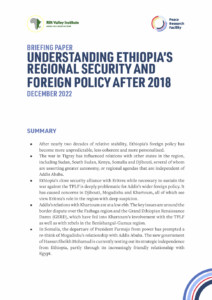This briefing was produced by the Ethiopia Peace Research Facility (PRF). The PRF is an independent facility combining timely analysis on peace and conflict from Ethiopian experts with support for conflict sensitive programming in the country. It is managed by the Rift Valley Institute and funded by the UK government.
SUMMARY
- After nearly two decades of relative stability, Ethiopia’s foreign policy has become more unpredictable, less coherent and more personalized.
- The war in Tigray has influenced relations with other states in the region, including Sudan, South Sudan, Kenya, Somalia and Djibouti, several of whom are asserting greater autonomy, or regional agendas that are independent of Addis Ababa.
- Ethiopia’s close security alliance with Eritrea while necessary to sustain the war against the TPLF is deeply problematic for Addis’s wider foreign policy. It has caused concerns in Djibouti, Mogadishu and Khartoum, all of which see view Eritrea’s role in the region with deep suspicion.
- Addis’s relations with Khartoum are at a low ebb. The key issues are around the border dispute over the Fashaga region and the Grand Ethiopian Renaissance Damn (GERD), which have fed into Khartoum’s involvement with the TPLF as well as with rebels in the Benishangul-Gumuz region.
- In Somalia, the departure of President Farmajo from power has prompted a re-think of Mogadishu’s relationship with Addis Ababa. The new government of Hassan Sheikh Mohamud is currently testing out its strategic independence from Ethiopia, partly through its increasingly friendly relationship with Egypt.
- South Sudan is also building a fraternal relationship with Cairo, which seeks new friendships in the region to isolate Ethiopia diplomatically, enabling it to impose pressure on Addis over the GERD. Potential developments on border security related to the Gambella Region have so far not come to fruition.
- Kenya and Ethiopia are building a fruitful economic partnership, particularly around telecoms, power generation and port use. President Ruto’s new government also seems to be seeking more involvement in peace and security issues, including the resolution of the Tigray conflict.
- Djibouti and Ethiopia remain economically interdependent with Djibouti port being of vital importance to the Ethiopian economy. Developments in Ethiopia’s Afar Region, with the likely involvement of Eritrea, may concern President Guelleh, whose own Afari population are seeking greater representation in the Issa (Somali) dominated polity.



